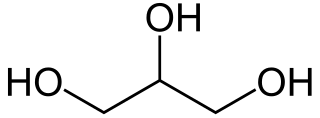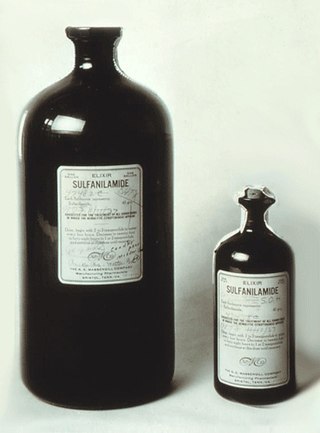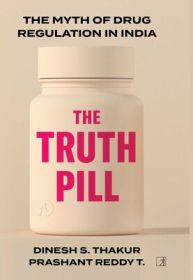Related Research Articles

Ethylene glycol is an organic compound with the formula (CH2OH)2. It is mainly used for two purposes: as a raw material in the manufacture of polyester fibers and for antifreeze formulations. It is an odorless, colorless, flammable, viscous liquid. It has a sweet taste, but is toxic in high concentrations. This molecule has been observed in outer space.

Glycerol, also called glycerine or glycerin, is a simple triol compound. It is a colorless, odorless, viscous liquid that is sweet-tasting and non-toxic. The glycerol backbone is found in lipids known as glycerides. It is also widely used as a sweetener in the food industry and as a humectant in pharmaceutical formulations. Because of its three hydroxyl groups, glycerol is miscible with water and is hygroscopic in nature.

Cold medicines are a group of medications taken individually or in combination as a treatment for the symptoms of the common cold and similar conditions of the upper respiratory tract. The term encompasses a broad array of drugs, including analgesics, antihistamines and decongestants, among many others. It also includes drugs which are marketed as cough suppressants or antitussives, but their effectiveness in reducing cough symptoms is unclear or minimal.

Diethylene glycol (DEG) is an organic compound with the formula (HOCH2CH2)2O. It is a colorless, practically odorless, and hygroscopic liquid with a sweetish taste. It is a four carbon dimer of ethylene glycol. It is miscible in water, alcohol, ether, acetone, and ethylene glycol. DEG is a widely used solvent. It can be a normal ingredient in various consumer products, and it can be a contaminant. DEG has also been misused to sweeten wine and beer, and to viscosify oral and topical pharmaceutical products. Its use has resulted in many epidemics of poisoning since the early 20th century.

The Standard for the Uniform Scheduling of Medicines and Poisons (SUSMP), also known as the Poisons Standard for short, is an Australian legislative instrument produced by the Therapeutic Goods Administration (TGA). Before 2010, it was known as the Standard for the Uniform Scheduling of Drugs and Poisons (SUSDP). The SUSMP classifies drugs and poisons into different Schedules signifying the degree of control recommended to be exercised over their availability to the public. As of 2024, the most recent version is the Therapeutic Goods Instrument 2024.
The pharmaceutical industry in India was valued at an estimated US$42 billion in 2021 and is estimated to reach $130 billion by 2030. India is the world's largest provider of generic medicines by volume, with a 20% share of total global pharmaceutical exports. It is also the largest vaccine supplier in the world by volume, accounting for more than 60% of all vaccines manufactured in the world. Indian pharmaceutical products are exported to various regulated markets including the US, UK, European Union and Canada.

Elixir sulfanilamide was an improperly prepared sulfonamide antibiotic that caused mass poisoning in the United States in 1937. It is believed to have killed more than 100 people. The public outcry caused by this incident and other similar disasters led to the passing of the 1938 Federal Food, Drug, and Cosmetic Act, which significantly increased the Food and Drug Administration's powers to regulate drugs.

Zheng Xiaoyu was the director of the State Food and Drug Administration of the People's Republic of China from 2003 to 2005. He was sentenced to death for corruption and allowing possibly tainted products in Mainland China in the first instance trial at Beijing No.1 Intermediate Court on May 29, 2007. He was executed on July 10, 2007.
In 2007, a series of product recalls and import bans were imposed by the product safety institutions of the United States, Canada, Western Europe, Australia, and New Zealand against products manufactured in and exported from the mainland of the People's Republic of China (PRC) because of numerous alleged consumer safety issues. The many product recalls within the year led Consumer Reports and other observers to dub 2007 "The Year of the Recall.”
Eduardo Arias was a Panamanian Guna, whose discovery of contaminated toothpaste saved lives by alerting the public to potentially poisonous products purchased from the People's Republic of China (PRC).
Ethylene glycol poisoning is poisoning caused by drinking ethylene glycol. Early symptoms include intoxication, vomiting and abdominal pain. Later symptoms may include a decreased level of consciousness, headache, and seizures. Long term outcomes may include kidney failure and brain damage. Toxicity and death may occur after drinking even in a small amount as ethylene glycol is more toxic than other diols.
A counterfeit medication or a counterfeit drug is a medication or pharmaceutical item which is produced and sold with the intent to deceptively represent its origin, authenticity, or effectiveness. A counterfeit drug may contain inappropriate quantities of active ingredients, or none, may be improperly processed within the body, may contain ingredients that are not on the label, or may be supplied with inaccurate or fake packaging and labeling. Counterfeit drugs are related to pharma fraud. Drug manufacturers and distributors are increasingly investing in countermeasures, such as traceability and authentication technologies, to try to minimise the impact of counterfeit drugs. Antibiotics with insufficient quantities of an active ingredient add to the problem of antibiotic resistance.

Wockhardt is an Indian pharmaceutical and biotechnology company headquartered in Mumbai, India. It produces formulations, biopharmaceuticals, nutrition products, vaccines and active pharmaceutical ingredients (APIs). The company has manufacturing plants in India, UK, Ireland, France and US, and subsidiaries in US, UK, Ireland and France.

Katherine "Kate" L. O'Brien is a Canadian American pediatric infectious disease physician, epidemiologist, and vaccinologist who specializes in the areas of pneumococcal epidemiology, pneumococcal vaccine trials and impact studies, and surveillance for pneumococcal disease. She is also known as an expert in infectious diseases in American Indian populations. O’Brien is currently the Director of the World Health Organization's Department of Immunization, Vaccines and Biologicals.
S. E. Massengill Company was a pharmaceutical company founded in 1898 by Samuel Evans Massengill, who graduated from the University of Nashville Medical School but decided to manufacture drugs rather than practice medicine himself. By 1937, it employed more than two hundred people in Bristol, Tennessee, including six graduate pharmaceutical chemists. In 2011, it was purchased by Prestige Brands, now known as Prestige Consumer Healthcare.

Alcohols, in various forms, are used medically as an antiseptic, disinfectant, and antidote. Alcohols applied to the skin are used to disinfect skin before a needle stick and before surgery. They may also be used as a hand sanitizer; to clean other areas; and in mouthwashes. Taken by mouth or injected into a vein, ethanol is used to treat methanol or ethylene glycol toxicity when fomepizole is not available.

The Truth Pill: The Myth of Drug Regulation in India is a 2022 book by whistleblower Dinesh Thakur and lawyer Prashant Reddy. The book highlights the problems in India's drug regulatory framework, and the government oversight relating to poor manufacturing practices and clinical trials of drugs by Indian pharmaceutical companies.

The Uzbekistan cough syrup scandal was a series of poisonings that resulted in the deaths of 18 children in Samarkand and two more children elsewhere in Uzbekistan in December 2022 and January 2023. It was caused by the toxic levels of diethylene glycol and ethylene glycol in cold medicines produced by the Indian company Marion Biotech, such as the Dok-1 Max brand. Subsequently, the Indian government investigated Marion Biotech's manufacturing processes, while Uzbek authorities opened a criminal case against members of the health system that had contributed to the children's deaths, such as regulatory officials and pharmacy administrators.
Gambia cough syrup scandal refers to the deaths of 70 children in The Gambia from the consumption of four cough syrups manufactured in India. In October 2022, the World Health Organization issued a medical product alert asking regulators to remove Maiden Pharmaceuticals' products from the market. The four products were Promethazine Oral Solution, Kofexmalin Baby Cough Syrup, Makoff Baby Cough Syrup and Magrip N Cold Syrup.
References
- 1 2 Bogdanich, Walt; Hooker, Jake (6 May 2007). "From China to Panama, a Trail of Poisoned Medicine". The New York Times . Retrieved 4 March 2015.
The syrupy poison, diethylene glycol, is an indispensable part of the modern world, an industrial solvent and prime ingredient in some antifreeze.
- ↑ Mao, Frances (20 October 2022). "Indonesia bans all syrup medicines after death of 99 children". BBC News. Retrieved 20 October 2022.
- ↑ "Boss of Indonesia cough syrup maker jailed after child deaths". BBC News. 2 November 2023. Retrieved 2 November 2023.
- ↑ "Guaifenesin: WHO issues alert over another India-made cough syrup". BBC News. 26 April 2023. Retrieved 26 April 2023.
- 1 2 "Toxic cough syrup kills 16 in Gujranwala: officials". Dawn.com. 29 December 2012. Retrieved 28 September 2023.
- ↑ "Toxic cough syrup kills dozens in Pakistan". ABC News. 29 December 2012. Retrieved 28 September 2023.
- 1 2 Bogdanich, Walt; Hooker, Jake (6 May 2007). "From China to Panama, a Trail of Poisoned Medicine" . The New York Times . Archived from the original on 13 March 2023. Retrieved 4 March 2015.
- 1 2 "China Blames Panama For Tainted Drugs". CBS News. 31 May 2007.
- ↑ "质检总局:巴拿马药品中毒事件责任在巴商人_新闻中心_新浪网" [General Administration of Quality Supervision, Inspection and Quarantine: Responsibility for the drug poisoning incident in Panama lies with the businessman]. news.sina.com.cn. 31 May 2007.
- ↑ Kraul, Chris (20 June 2007). "Panama agency's prepared 'medicine' has deadly effects". Los Angeles Times.
- ↑ "Medical Product Alert N°6/2022: Substandard (contaminated) paediatric medicines". www.who.int. 5 October 2022. Retrieved 9 October 2022.
- 1 2 "Warning over cough syrups after 66 children die in the Gambia". The Guardian. Guardian staff and agencies. 6 October 2022. Retrieved 9 October 2022.
{{cite web}}: CS1 maint: others (link) - ↑ "Four India-made cough syrups under the scanner; CDSCO initiates probe after WHO red-flags". The Economic Times (video). Mirror Now. 6 October 2022. Retrieved 9 October 2022.
- 1 2 "Marion Biotech: Uzbekistan links child deaths to India cough syrup". BBC News. 29 December 2022. Retrieved 29 December 2022.
- ↑ Das, Krishna N. (14 June 2023). "Exclusive: India probes bribery claim in toxic syrup tests" . Reuters. Archived from the original on 14 June 2023. Retrieved 2 July 2023.
- ↑ "A scandal rocks India's pharmaceutical industry". The Economist. ISSN 0013-0613 . Retrieved 7 January 2023.
- ↑ "Uzbekistan Arrests Four Over Child Deaths Linked To Indian Cough Syrup". Radio Free Europe/Radio Liberty. Retrieved 7 January 2023.
- ↑ Sharma, Saurabh; Das, Krishna N. (28 June 2023). "Exclusive: Indian firm used toxic industrial-grade ingredient in syrup" . Reuters. Archived from the original on 30 June 2023.
- ↑ Mollan, Cherylann (23 May 2023). "India makes cough syrup testing mandatory for exports". BBC News. Retrieved 23 May 2023.
- ↑ Newey, Sarah (20 July 2023). "Bogus British company caught selling toxic cough syrup in Cameroon". The Telegraph. ISSN 0307-1235 . Retrieved 22 August 2023.
- ↑ Lateef, Samaan; Lovett, Samuel (27 July 2023). "Fake British cough syrup linked to Cameroon child deaths was made in India, officials say". The Telegraph. ISSN 0307-1235 . Retrieved 22 August 2023.
- ↑ Rigby, Jennifer (16 June 2023). "Exclusive: WHO says toxic syrup risk 'ongoing', more countries hit" . Reuters. Archived from the original on 30 June 2023. Retrieved 2 July 2023.
- ↑ Rigby, Jennifer; Deshmukh, Shubhendusatish (7 December 2023). "WHO says more contaminated medicinal syrups found in new regions". Reuters. Retrieved 24 May 2024.